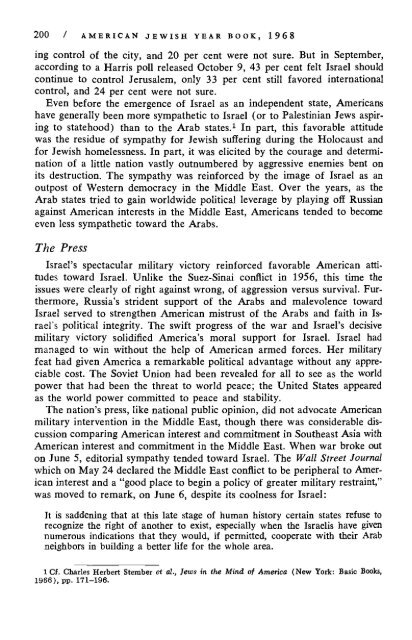1968_4_arabisraelwar
Create successful ePaper yourself
Turn your PDF publications into a flip-book with our unique Google optimized e-Paper software.
200 / AMERICAN JEWISH YEAR BOOK, <strong>1968</strong><br />
ing control of the city, and 20 per cent were not sure. But in September,<br />
according to a Harris poll released October 9, 43 per cent felt Israel should<br />
continue to control Jerusalem, only 33 per cent still favored international<br />
control, and 24 per cent were not sure.<br />
Even before the emergence of Israel as an independent state, Americans<br />
have generally been more sympathetic to Israel (or to Palestinian Jews aspiring<br />
to statehood) than to the Arab states. 1 In part, this favorable attitude<br />
was the residue of sympathy for Jewish suffering during the Holocaust and<br />
for Jewish homelessness. In part, it was elicited by the courage and determination<br />
of a little nation vastly outnumbered by aggressive enemies bent on<br />
its destruction. The sympathy was reinforced by the image of Israel as an<br />
outpost of Western democracy in the Middle East. Over the years, as the<br />
Arab states tried to gain worldwide political leverage by playing off Russian<br />
against American interests in the Middle East, Americans tended to become<br />
even less sympathetic toward the Arabs.<br />
The Press<br />
Israel's spectacular military victory reinforced favorable American attitudes<br />
toward Israel. Unlike the Suez-Sinai conflict in 1956, this time the<br />
issues were clearly of right against wrong, of aggression versus survival. Furthermore,<br />
Russia's strident support of the Arabs and malevolence toward<br />
Israel served to strengthen American mistrust of the Arabs and faith in Israel's<br />
political integrity. The swift progress of the war and Israel's decisive<br />
military victory solidified America's moral support for Israel. Israel had<br />
managed to win without the help of American armed forces. Her military<br />
feat had given America a remarkable political advantage without any appreciable<br />
cost. The Soviet Union had been revealed for all to see as the world<br />
power that had been the threat to world peace; the United States appeared<br />
as the world power committed to peace and stability.<br />
The nation's press, like national public opinion, did not advocate American<br />
military intervention in the Middle East, though there was considerable discussion<br />
comparing American interest and commitment in Southeast Asia with<br />
American interest and commitment in the Middle East. When war broke out<br />
on June 5, editorial sympathy tended toward Israel. The Wall Street Journal<br />
which on May 24 declared the Middle East conflict to be peripheral to American<br />
interest and a "good place to begin a policy of greater military restraint,"<br />
was moved to remark, on June 6, despite its coolness for Israel:<br />
It is saddening that at this late stage of human history certain states refuse to<br />
recognize the right of another to exist, especially when the Israelis have given<br />
numerous indications that they would, if permitted, cooperate with their Arab<br />
neighbors in building a better life for the whole area.<br />
1 Cf. Charles Herbert Steraber et ah, Jews in the Mind of America (New York: Basic Books,<br />
1966), pp. 171-196.


